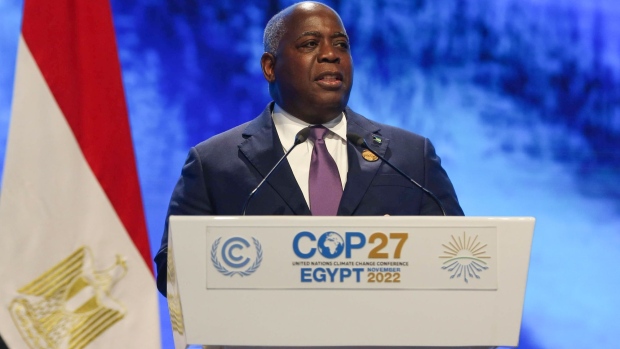Nov 8, 2022
The Bahamas Wants Money to Protect Its Oceans
, Bloomberg News

(Bloomberg) -- Subscribe to Zero on Apple, Spotify and Google.
Three years after a Category 5 hurricane caused billions of dollars in damage in The Bahamas, Prime Minister Philip Davis warned that the increasing frequency of such storms has grave implications for how Bahamaians live. As COP27 kicked off in Egypt this week, that warning gave way to a demand: Show us the money.
“It’s no longer an existential threat; it’s a crisis for us. And we can't outrun the consequences: We’re either going to be climate refugees, or we'll find ourselves in watery graves,” Davis told Akshat Rathi on the Zero podcast, recorded on the ground at COP27. “Hurricane Dorian cost us $3.4 billion in loss and damage. We still don't know how many lives were lost, and we’re still trying to pull ourselves out of it. If you profile our debt, I suspect that more than 40% of our debt is directly linked to the impacts of climate change.”
Davis, alongside other leaders of climate-vulnerable nations, says he wants developed countries to foot the bill they helped run up. That stance is part of a larger COP27 conversation around loss and damage, or the idea that developed nations with a history of high emissions need to pay developing countries for the damage caused by climate change. Caribbean nations are starting to coalesce around what that compensation might look like, including potentially cash payments, debt relief, money for protecting the ocean, incentives to avoid oil drilling and a 2% levy on oil exports.
As those conversations gained traction in Sharm el-Sheikh, Davis and Rathi talked about consensus-building, the debt cycle of climate-vulnerable countries and carbon offsets’ credibility problem. Rathi also spoke with Rhianna Neely-Murphy, an advisor to Davis, and Bloomberg Green executive editor Aaron Rutkoff, about this year’s COP.
Listen to the full conversation below.
Check out more episodes of Zero, and subscribe on Apple, Spotify and Google to hear new ones every Thursday.
©2022 Bloomberg L.P.


